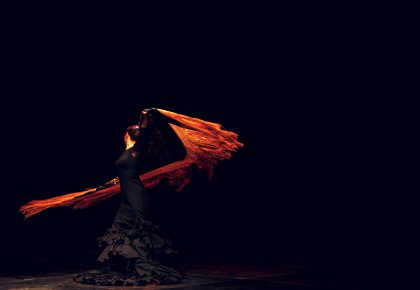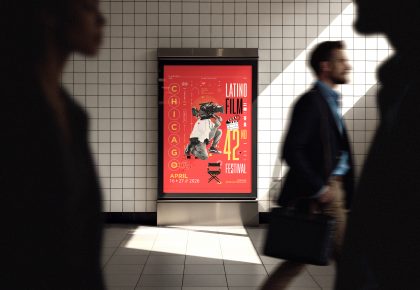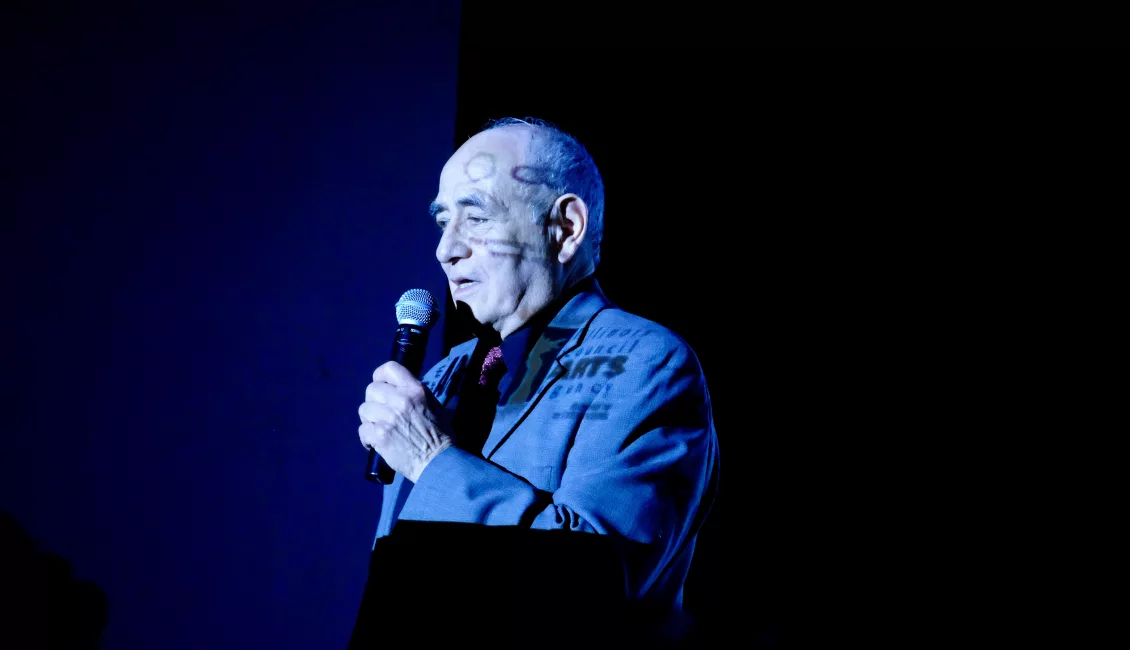
This content has been archived. It may no longer be relevant
CHICAGO (March 22, 2023) – The 39th Chicago Latino Film Festival (CLFF) last night presented, at an invitation only event at Instituto Cervantes, its full slate of films and special events. Produced by the International Latino Cultural Center of Chicago, the Festival will present 51 features and 35 shorts from April 13th to April 23rd, most of them at the Landmark Century Center, 2828 N. Clark St.
The Festival last week announced the Opening Night selection of Claudia Sainte-Luce’s offbeat comedy Love & Mathematics (Thursday, April 13) and the Closing Night selection of Patricia Ortega’s kinky and poignant comedy about sexual awakening among the elderly, Mamacruz (Saturday, April 22). Both Opening and Closing Night will take place at the AMC River East 21, 322 E. Illinois St. Doors open at 5:30 p.m and events will start at 6:30 p.m.; the events will conclude with a post-screening party at Chez, 247 E. Ontario.
The Festival also previously unveiled its first wave of titles which included: 15 Ways to Kill Your Neighbor (Argentina); Sad Machines (Argentina); Blanquita (Chile); I Have Electric Dreams (Costa Rica); Agustina (Mexico: Daughter of Rage (Nicaragua); Eami (Paraguay); The Fishbowl (Puerto Rico); Amigo (USA); and Daughter of the Sea (USA).
Titles announced yesterday include:
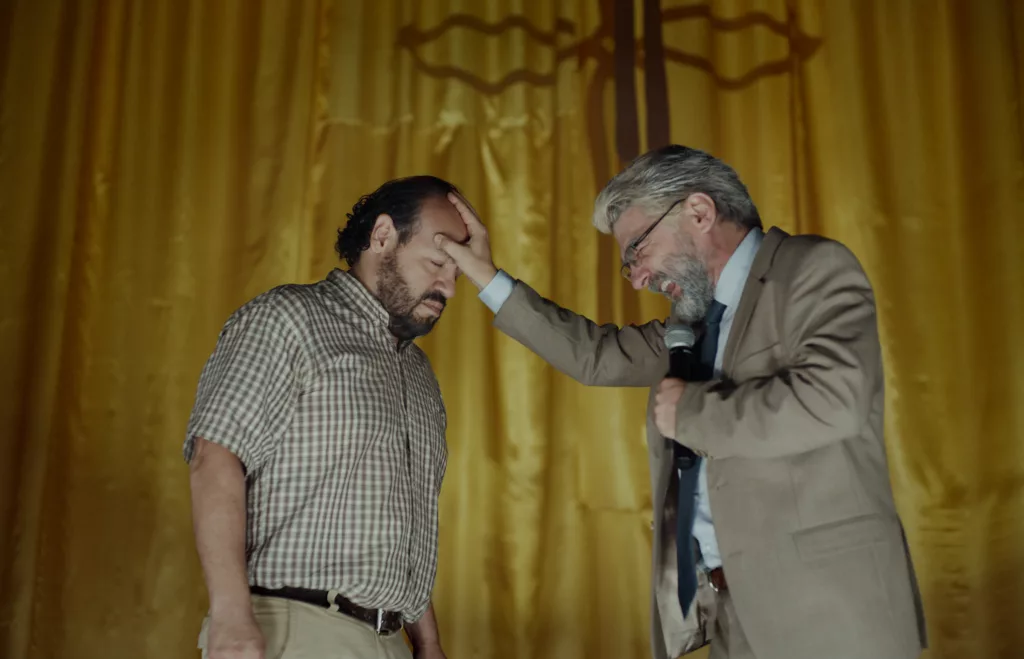
- The Visitor/El visitante (Bolivia/Uruguay; Director: Martin Boulocq): Humberto’s greatest desire, after his recent release from prison, is to rebuild his relationship with his estranged daughter and provide her with a decent life. But her grandparents—wealthy Evangelical pastors—are not willing to give up custody. Bullied into a corner financially and ideologically, Humberto is forced to face his own demons while simultaneously fighting a powerful religious institution to which he once belonged. Set in the central Bolivian city of Cochabamba, The Visitor is a somber meditation on class, family relationships, and the increasing power of Evangelism in Latin America.
- The Truths/As Verdades (Brazil; Director: José Eduardo Belmonte): Belmonte’s Rashomon-like thriller finds newly appointed police chief Josué (Lázaro Ramos, Madame Sata) investigating the murder of a local politician in a coastal town of Bahía. Told from the perspective of the politician’s fiancée, the apparent hitman and even the victim, The Truths is an intriguing and engaging whodunit where each suspect has his or her own agenda as they settle old scores.
- La jauría (Colombia/France; Director: Andrés Ramírez Pulido): Winner of the Critics’ Week Grand Prize at the Cannes Film Festival and nominated to a Goya for Best Iberoamerican Film, Ramírez Pulido’s feature debut begins with a murder: best friends Eliú and Mono have killed a man they mistake for Eliú’s father. Eliú is sent to an experimental institution deep in the heart of Colombia’s tropical forests, where he performs manual labor and endures group therapy under the watchful eye of guard Godoy. Mono arrives days later and finds that he and his friend are stuck in a drug-induced purgatory where they serve as cheap labor.
- Parsley/Perejil (Dominican Republic; Director: José María Cabral): Last year’s winner of the Audience Award for Narrative Feature Film at the Miami International Film Festival, Cabal’s (Woodpeckers, The Projectionist) new film takes place during the infamous 1937 massacre of Haitians ordered by Dominican dictator Rafael Leónidas Trujillo. Marie, a Haitian woman expecting her first child with Dominican husband Frank, is forced into hiding when her village is attacked by the armed forces. She seeks refuge in the mountains, hoping that she will not turn into another victim of this brutal racist attack.
- Octopus Skin/La piel pulpo (Ecuador/Greece/Germany/Mexico/France/Italy, Director: Ana Cristina Barragán): Ana Cristina Barragán’s sensuous and enigmatic follow-up to her critically acclaimed Alba, focuses on 17-year-old twins Iris and Ariel who live a semi-idyllic life on an island with their older sister and mother. Isolated from the mainland, their mother’s sudden departure creates a rift between the three siblings. Iris leaves for the city in search for the truth behind her mother’s decision to keep them apart from that world.
- The Silence of the Mole/El silencio del topo (Guatemala; Director: Anaïs Taracena): Guatemala’s official selection for Best International Feature at the 95th Academy Awards, Anaïs Taracena’s documentary tells the daring story of journalist Elías Barahona, El topo, who in the 1970s infiltrated General Romeo García’s dictatorship posing as a press officer for the Ministry of the Interior. As such, he was able to retrieve and release information about human rights abuses even as his closest friends were convinced that he was a traitor.
- Life in Silence/La vida en el silencio (Mexico; Director: Rodrigo Arnaz): Juan Manuel Bernal stars in Arnaz’s 16mm feature debut as Fran, a freelance musician and single father who takes care of his 10-year-old autistic son. He hopes his son’s language therapy sessions will break the wall that stands between them. But when Mariana, Samuel’s mother, returns to their lives after abandoning them, Fran will have to decide what is best for his son.
- Without Prescription/Receta no incluída (Puerto Rico; Director: Juliana Maité): Olivia has managed to keep her OCD at bay for a year. But that little voice in her head that compels her to brush her teeth over and over makes an unexpected visit in the middle of her family’s Christmas party. Unable to secure her prescription because of her insurance, she asks David, the local pharmacist’s son, to sell her some illegally. A nasty rainstorm traps both Olivia and David in his apartment. Winner of the Audience Award in the Global category in the 2022 SXSW Film Festival.
- Daughters of Witches (USA; Director: Faride Schroeder Lases): Mexican immigrant Clara (Yaritza Aparicio), who now resides in the United States, returns home to introduce her newborn daughter to her family. As part of an ancient family tradition, she and her baby must participate in a ritual in the middle of the forest.
- Santos – Skin to Skin (USA; Director: Kathryn Golden): One of the world’s foremost exponents of Afro-Latin music, Santos, through his mixed Puerto Rican and Cape Verdean heritage, strives to unite and expand his kaleidoscopic audience. Kathryn Golden follows Santos from rehearsals in his garage studio in Oakland, California, to performances at local community centers, gigs with congueros in Peñuelas, San Germán and Guánica, Puerto Rico, and concert stages around the United States. Rich in unforgettable musical performances, the documentary captures Santos playing alongside a stellar cast of international jazz musicians, including Eddie Palmieri, Omar Sosa, and Jerry Medina.
“ ‘Our next Festival needs to be even better than the last one’ has been our mantra for 39 years and that wouldn’t be possible without a great roster of films. And this year’s films are extraordinary. They represent a fraction of the incredible work that is coming out of Latin America, Spain, Portugal and the Caribbean,” said Pepe Vargas, founder and executive director of the International Latino Cultural Center of Chicago. “We are happy to bring back the full Festival theatrical experience to Chicago moviegoers and to welcome all these amazing film artists to our great city.”
CLFF remains a non-competitive festival. However, since 1993, the public has had the opportunity to vote for their favorite film in several categories and award them with the Audience Choice Award. The winner will be announced on Thursday, April 27th.
ADDITIONAL PROGRAMS
The 39th Chicago Latino Film Festival also announced last night three special events produced in partnership with the Segundo Ruiz Belvis Cultural Center and Instituto Cervantes.
On Saturday, April 15, La Pecera (The Fishbowl) director Glorimar Marrero Sánchez will join a group of visiting Latin American Women Film Artists in a conversation about their experiences behind the camera at the Segundo Ruiz Belvis Cultural Center, 4048 W. Armitage Ave. The event starts at 4 p.m. Guests and moderator will be announced closer to the date via the Festival’s social media channels. (Facebook: @ChicagoLatinoFilmFestival; Twitter: @ChiLatinoFilm; Instagram: @chilatinofilm). Admission is free.
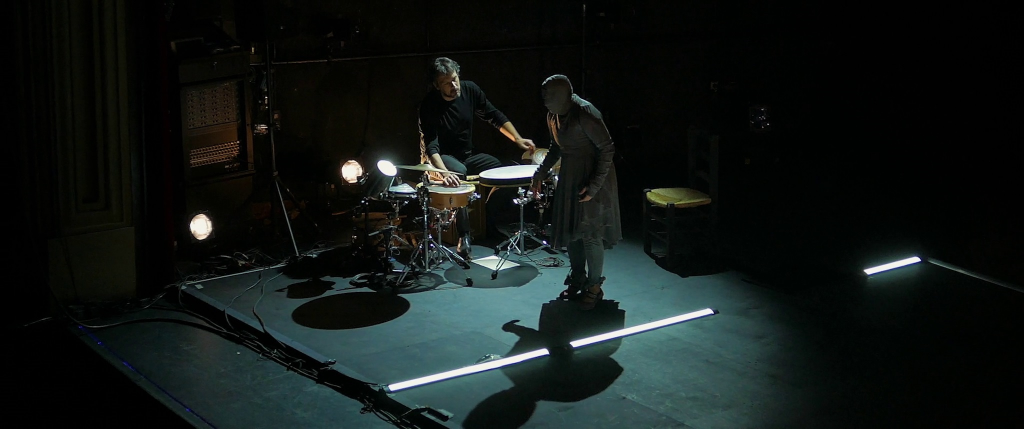
CLFF and Instituto Cervantes Chicago will present a special screening of the documentary Frente al silencio (Facing the Silence) on Wednesday, April 19. Emilio Ruiz Barrachina’s latest feature centers on acclaimed flamenco choreographer and dancer Fuensanta La Moneta who is working on a new show when one of her students gives her a copy of Félix Grande’s poetry collection La cabellera de la Shoá. Written by Grande after his visit to Auschwitz, Fuensanta can’t stop thinking about those women —Jewish and Gypsy alike— who lost their lives in the concentration camp. The poems inspire her to create a piece that remembers these women through music, dance and poetry. Barrachina and producer Rebecca Arrosse are scheduled to attend the screening. The event starts with a reception at 6 p.m. followed at 7 p.m. with the screening and post-screening Q&A at the Instituto Cervantes, 31 W. Ohio St. See below for ticket information.
Finally, on Friday, April 21, master percussionist John Santos (the subject of the documentary Santos – Skin to Skin) will be presenting the lecture Sounds of Resistance: An Overview of the Evolution of Puerto Rican Music at the Segundo Ruiz Belvis Cultural Center, 4048 W. Armitage Ave., as part of the Center’s Friday Bomba Labs. This lecture will focus on how traditional and contemporary forms of music have provided a platform for creative expression and resistance to all forms of oppression. Video and audio recordings and slides from Mr. Santos’ collection will provide a snapshot of a complex and profound musical history. The event starts at 7 p.m. and is free. For more information on this and the April 15 event, visit http://segundoruizbelvis.org
STUDENT SCREENINGS
After three years of remote screenings, Festival organizers have scheduled 15 student screenings from April 18 – 20 at the Landmark Century Cinema as part of their Student Free Matinee Outreach Program. More than fifty public and private schools are expected to participate in the program.
Created as an educational component to the Festival, the program offers Latino and non-Latino elementary and high school students the opportunity to learn about the diversity of Latino cultures and to connect with their own heritage. In addition, students have a chance to meet with the artists involved in the making of the film and discuss viable career options in the arts. The 2023 Student Matinee Outreach Program is supported by The Reva & David Logan Foundation. This is the 28th Anniversary of the Free Student Matinee Program.
TICKET INFORMATION
Tickets to each regular screening at the Landmark Century Center are: $15, general admission; $12 (with valid ID), ILCC members, students and seniors. Festival passes worth 10 admissions are: $125 for the general public and $105 for ILCC Members, students and seniors.
Monday and Tuesday night specials at the Landmark Century Center: all films, $12.
Tickets to the Opening and Closing Night galas are $75 general / $65 for ILCC members. Admission includes the film screening and party. Cocktail attire is strongly encouraged.
Tickets for the special screening of Facing the Silence at the Instituto Cervantes on Wednesday, April 19 are $30 general / $25 for ILCC members.
Tickets can be purchased at chicagolatinofilmfestival.org.
SPONSORS
The 39th Chicago Latino Film Festival is sponsored by: Tito’s Hand-made Vodka, Humboldt Park Health, US Bank, Xfinity, Lopez & Co., The Whitehall Hotel, Tristan & Cervantes, Illinois Film Office, Consulate of Chile, Prado & Renteria and Instituto Cervantes
Media Sponsors: WBEZ/Vocalo, WTTW, CAN-TV, La Raza, Telemundo Chicago/NBC-5, Chicago Latino Network, LatinBisToday, InSpanish, DBO Films
ADDITIONAL SUPPORT
The 39th Chicago Latino Film Festival receives additional support from: Chicago’s Cultural Treasures, Reva & David Logan Foundation, Paul M. Angell Family Foundation, The Joyce Foundation, Gaylord & Dorothy Donnelley Foundation, The Field Foundation, MacArthur Foundation / Prince Charitable Trusts, League of Chicago Theaters/ComEd, Art Works Fund, DCASE, National Endowment for the Arts and Illinois Arts Council
ABOUT THE ILCC
The International Latino Cultural Center of Chicago is a pan-Latino, nonprofit, multidisciplinary arts organization dedicated to developing, promoting, and increasing awareness of Latino cultures among Latinos and other communities by presenting a wide variety of art forms and education including film, music, dance, visual arts, comedy, theater and culinary arts. The Center prides itself for its outstanding multidisciplinary local and international cultural programming which spans Latin America, Spain, Portugal, and the United States.
Born out of the Chicago Latino Film Festival, The International Latino Cultural Center of Chicago also produces other programs, including the Chicago Latino Music Series, which is celebrating its 17th edition this year; Film in the Parks, also in its 17th season; the monthly Reel Film Club, already in its 15th year; and many others.
All in all, the audience has grown from 500 people in 1985 for the first Chicago Latino Film Festival to more than 70,000 (Latinos and non-Latinos) who enjoy the year-round multidisciplinary cross-cultural exchanges offered by the Center.
